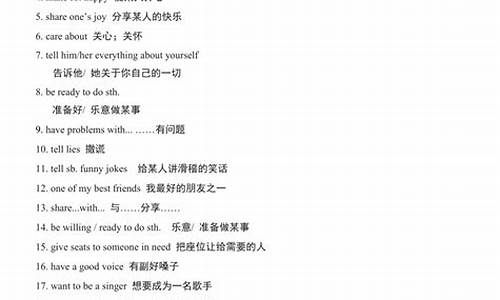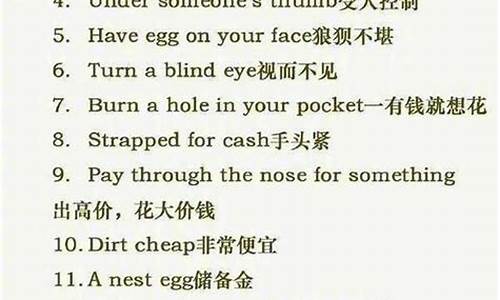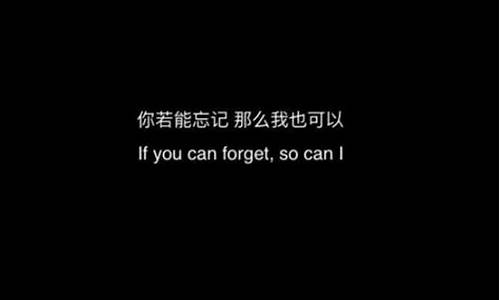八年级上册英语句子归纳_八年级上册的英语句子
1.八年级英语知识点梳理2021
2.翻译八年级上册英语句子:
3.八年级上册英语语法、词组、难点句型、例题
4.八年级上册英语第九,十单元重点句子
5.八年级上英语复习提纲 重点短语和句子
6.英语八年级上册UNIT4有哪些重点语法

Unit 7
☆ 句子
How do you make a banana milk shake?
问数量
1. How many bananas do we need? We need 5.
2. How much yogurt do we need? One cup.
☆ 核心知识
1. 量词 a cup of, a bottle of, a piece of,
a bowl of, a pair of, a box of,
a slice of, a teaspoon of
2. 连词 first, next, then, finally
3. turn on 打开, turn off 关上, turn down 关小
4. cut up 切碎
5. mix up 混合
6. add … to … 把……加到……上
☆ 熟读
P41 1b, P42 2c G.F., P 43 3a, P45 3a
☆ 写作 写一篇制作食物的步骤
Unit 8
☆ 句子
1. Did you go to the zoo? Yes, I did. No, I didn't.
2. Were there any sharks?
Yes, there were. No, there weren't.
3. What else did you do? 你还做了些什么?
☆ 核心知识
一般过去时
1. hang out 闲荡
2. have a good time 过得愉快
3. late adj. / adv. 迟 4. take a class 上课
5. luck n. lucky adj. luckily adv.
6. see you soon 盼望很快见到你
7. in the future
8. at the end of …在……的最后
9. have fun doing sth. 做某事很有趣
10. go for a drive 开车兜风
11. visit v. 参观, visitor n. 参观者
☆ 写作 P49 3a 和P51 3a
记叙一天所做的事
☆ 熟读 P47 1b, P48 2b G.F., P 49 3a, P51 3a
Unit 9
☆ 句子
1. When was he born ? He was born in 1895.
2. How long did he hiccup? For 5days.
3. When did he start hiccupping?
He started hiccupping in 1922.
☆ 核心知识
一般过去时
1. be born 出生
2. start doing = start to do 开始做某事
begin doing = begin to do
3. too …to 太……而不能做某事
4. violinist 小提琴家, violin 小提琴
pianist 钢琴家,piano 钢琴
5. well-known adj. 著名的
6. at the age of … 在……岁
7. take part in 参加 某种活动、比赛、项目
join 参加 某个组织 成为其中一员
8. because of+名词 因为
9. 70-year adj. 70年的
10. usual adj. 寻常的, unusual adj. 不寻常的
☆ 写作 P55 3a 和 P57 3a 描写人物
☆ 熟读 P53 1b, P54 2c G.F, P55 3a, P56 2b 2c, P57 3a
Unit 10
☆ 句子
1. What are you going to do when you grow up?
I'm going to be an actor.
2. How are you going to do that?
I'm going to take acting lesson.
☆ 核心知识
1. be going to 是一般将来时
① 表将要发生的动作或存在的状态。
② 常和将来的时间连用。如:
next day/ week/ month / year …
in the future, in 20 years, tomorrow,
the day after tomorrow 等
2. grow up 长大
3. at the same time 同时
4. read v. reader n. 读者
5. somewhere interesting 有趣的地方
6. save money 存钱
7. maybe 也许
8. get good grades 取得好成绩
9. keep fit = keep healthy
10. 时间状语从句
由 when, after, before, as soon as, not…until, while, since 等词引导。
注:当主句是一般将来时,从句用一般现在时
I will be a teacher when I grow up.
☆ 写作 P61 3a 如何实现自己的梦想
☆ 熟读 P59 1b 1c, P60 GF., P 61 3a 3b, P62 1a 1b, P63 3a
Unit 11
☆ 句子
表请求句子以及回答
1. Could you please sweep the floor?
Yes, sure. Sorry, I can't. I have to go out.
2. Could I please go to the movies?
Yes, you can. No, you can't. I have to go out.
☆ 核心知识
1. could you please … 你能……吗?/请你干……,好吗?
2. need to do sth.
3. hate doing/ to do sth. 讨厌做某事
4. do the dishes 洗餐具
5. sweep the floor 清扫地板
6. stay out late 晚归
7. make one's bed 铺床
8. fold one's clothes 叠衣服
9. take out the trash 倒垃圾
10. invite sb. to do./ somewhere
邀请某人做某事/到某地
11. take care of = look after 照顾
12. forget to do 忘记去做某事
13. help n. (不可数) help v.
14. have a test 休息
15. borrow sth. from sb. 向某人借某物(借入)
16. agree 同意 disagree 不同意
☆ 写作 P69 3a 请求帮助的信
☆ 熟读 P65 1a 1b, P66 2c G.F., P67 3a 4, P68 1a, P69 3a
Unit 12
☆ 句子
1. What is the best clothing store? Jason's.
☆ 核心知识
1. 形容词、副词的比较级和最高级
2. love v. 喜爱 lovely adj. 美好的,令人愉快的
3. south n. southern adj.
north n. northern adj.
east n. eastern adj.
west n. western adj.
4. close to 靠近;接近
5. music n. musician n. musical adj.
6. lead v. 指挥,指导 leader n. 主唱人 指挥者
☆ 写作 P76 2 介绍一个旅游景点
☆ 熟读 P71 1b, P72 2c G.F, P73 3a, P75 3a, P76 2
八年级英语知识点梳理2021
答案是:
1.where
did
you
go
on
vacation
Iwent
to
NewYork
city
你去哪里度假了?
我去了纽约市
2.Did
you
go
with
anyone
no,No
one
was
here
,Everyone
was
on
vacation
拟合别人一起去了吗?不,这里没有人,所有人都去度假了
3.Did
you
buy
anything
special
Yes,I
bought
something
for
my
father
你买了什么忒别的东西了吗?是的,我给爸爸买了些东西
4.How
was
the
food
Everythingtasted
really
good
食物怎么样?所有的食物尝起来都很好
5.Did
everyone
have
a
good
time
Oh,yes,Everything
was excellent
每个人都玩的很开心吗?嗯,是的,一切都很棒
手工翻译?尊重劳动?欢迎提问?感谢采纳?翻译八年级上册英语句子:
天才就是勤奋曾经有人这样说过。如果这话不完全正确,那至少在很大程度上是正确的。学习,就算是天才,也是需要不断练习与记忆的。下面是我给大家整理的一些 八年级 英语的知识点,希望对大家有所帮助。
英语八年级上册知识点 总结
一、 v+ do
1. Let sb do sth 让某人做某事
Let sb not do sth 让某人不做某事
2.why not do sth = why don’t you do sth 做什么怎么样 为什么不做?
Why not put on a raincoat, its raining outside. 外面在下雨,为什么不穿个雨衣呢?
3. Make sb do sth 使某人做某事
I will do my best to make my dream come true. 我会尽我所能去使我的梦想实现。
Make sb + adj 使某人………..
The story makes us happy。
二、v+ doing
1. practice doing sth 练习做某事 our English teacher told us to practice speaking English
every day。英语老师叫我们每天练习说英语。
2. finish doing sth 完成做某事 my mum asks me to finishing cleaning up my room before
she come from work。 妈妈要求我在她下班回来之前打扫干净我的房间。
3. Enjoy doing sth 享受做某事
The boys are enjoying playing basketball 孩子们正在操场上享受打 篮球 。
4. stand doing sth 忍受做某事她不能忍受欺骗他人
5. mind doing sth 介意做某事? 你介意开门吗?
6. keep doing sth. 继续做某事
She will keep fighting in this new semester. 在新学期,她将继续努力奋斗
八年级上册英语期中知识点总结
一、重点 短语 :
1.on weekends
2.on weekdays
3.as for
4.my eating habits
5.have a healthy lifestyle
6.the same as
7.the result of
8.junk food
9.get good grades
10.see a dentist
11.have a healthy habit
12.be stressed out
13.a balanced diet
14.for example
15.at the moment
16.be sorry to do sth
17.go bike riding
18.take walks=go for walk
19.take a vacation
20.plan to do sth
21.western country
22.take sth with sb
23.depend on
24.host family
25.hardly ever
26.ask sb about sth
27.get back to school
28.a balance of
29.kind of
初二期末英语语法知识点总结归纳
1.主语:
表示 句子 所说的是“什么人”或“什么事儿”,一般由名词,代词或相当于名词的词或者短语充当
例如:Gina is from Australia.
She often goes to the movies.
This kind of juice tastes good!
2.谓语:
主语发出的动作。一般是有动作意义的动词。谓语和主语在人称和数两个方面必须保持一致。
例如: We are both quiet.
He has a smart phone.
You should study harder.
Her parents are teachers.
3. 宾语:
分为动词宾语和介词宾语,属于动作的承受者。
例如:He's playing .
Good food and exercise help me to study harder.
4. 系动词:
表示状态或状态变化的动词,没有实际的动作意义。如 be, 感官系动词(look, sound, smell, taste 和 feel)、保持类系动词(keep, stay 和 remain)、状态变化类系动词(become、get、turn 和 go)等。
This picture looks so beautiful.
Keep working, you will see the post office on your right.
八年级英语知识点梳理总结相关 文章 :
★ 八年级英语知识点归纳总结最新
★ 人教版八年级英语知识点总结
★ 八年级英语语法知识点归纳总结
★ 人教版八年级下册英语知识点总结
★ 八年级英语上册知识点归纳小总结
★ 人教版八年级英语知识点总结
★ 八年级英语上册知识点归纳小结
★ 初二英语知识点总结
★ 八年级上册英语知识点归纳
★ 八年级上册英语重点总结
八年级上册英语语法、词组、难点句型、例题
1、The is trying to protect and repair the old wall.
2、Every year, many people visit the Great Wall in gain a lot of fun.
3、Now Beijing still has many of the ancient Great Wall, isn't it?
4、Use the live who built the model, isn't?
5、Let's go to see, ok?
6、You know very well to them, is it?
7、From then on, people put the Great Wall as the symbol of the Chinese nation.
8、The Great Wall of China is the world's greatest wonders.
9、The great pyramid have all around, each face 230.4 meters long.
10、100000 people spent more than 20 years to build it.
11、Most of the city in the 1960 s were broken down, because they have been broken.
12、This building is composed of two million blocks, and each have two tons of multiple.
13、Qin shihuang, China's first emperor, and old wall together.
14、Located in the center of the xian xian.
15、It is the best of China to protect the wall. It has a history of over six hundred years.
八年级上册英语第九,十单元重点句子
八年级册1-7单元重点句型
作者:郝昌明
一、 have fun doing sth.
句型介绍 意为\"做某事有乐趣\",其中have fun 相当于enjoy oneself,表示过得愉快。
八年级册1-7单元重点知识回顾
作者:高德胜
1. 英语中的集体名词,如family, class, team等作主语时,若作为一个整体看,其后的谓语动词用单数;若强调其组成成员,谓语动词用复数。如:
My family is a happy one. 我家是个幸福的家庭。
My family are all watching TV. 我们全家人都在看电视。
2. 在比较级中,要注意than后面人称代词的格。
1)当句子中的谓语动词是不及物动词时,than后面的代词用主格还是宾格,在意思上通常没有区别。如:
He runs faster than I / me. 他跑得比我快。
They get to school earlier than we / us every day. 他们每天都比我们到校早。
2)当句中的谓语动词是及物动词时,than后面的人称代词用主格还是宾格在意思上就有差别了。试比较:
I like you more than he. (=I like you more than he likes you.) 我比他更喜欢你。
I like you more than him. (=I like you more than I like him.) 你和他相比,我更喜欢你。
3. 不定式作定语时,应放在被修饰词的后面,一般指一个还没有发生的动作。如:
Do you have anything to say about this? 有关这件事你有没有什么要说的?
4. 在比较句型中,than后面的谓语动词常常省略。也可以用相应的助动词来代替与前面相同的谓语动词,以避免重复。如:
Tom does better at the lessons than I (do). 汤姆功课比我好。
She ate less than I (did) for breakfast. 她早饭吃得比我少。
5. You\'d better ... 是You had better ... 的缩写形式。 had better 为固定短语,意为\"最好......\",后接动词原形,常用来提出建议或劝告,其否定形式是\"had better not + 动词原形\"。如:
You\'d better not stay there too long. 你最好别在那里呆得太久。
We had fun playing computer games. 我们玩电脑游戏很愉快。
句式比较 have a good / nice / wonderful time doing sth. 做某事有乐趣
Did you have a good / nice / wonderful time visiting that country? 访问那个国家你们快乐吗?
特别提醒 句中fun为不可数名词,表乐趣,前面不能加不定冠词。
二、 But I don\'t know what to do.
句型介绍 疑问词 + 不定式可作主语、宾语或表语。
I don\'t know how to get her help. 我不知道怎样才能得到她的帮助。
Where to buy this kind of seed is unknown to me. 我不知道去哪儿购买这种种子。
My question is when to leave for Tokyo. 我的问题是什么时候去东京。
句式比较 疑问词 + 不定式可转换成连词(原疑问词)引导的主语从句、宾语从句和表语从句。
I don\'t know where we can find her. 我不知道在哪儿能找到她。
How she will go there is still a secret. 她怎么去那里还是一个谜。
Her question is how she can pass the exam. 她的问题是她怎样才能通过这次考试。
特别提醒 疑问词 + 不定式转换成宾语从句时应用陈述语序。
三、 This is ... speaking.
句型介绍 该句为打电话用语,用来进行自我介绍,This代表我,speaking可以省去。
Hello! This is Tom (speaking). 你好,我是汤姆。
句式比较 Who is that (speaking)? 你是谁?that用来询问对方是谁,speaking可以省去。 Is that ... (speaking)? 你是......吗?that也用来询问对方是谁, speaking也可以省去。
This is Mary (speaking). Who is that (speaking)? 我是玛丽,你是谁?
Is that Jane (speaking)? 你是詹妮吗?
特别提醒 this不能换成I, that不能换成you。
四、 hear sb. / sth. doing
句型介绍 意为\"听见某人 / 物正在做......\",句中doing为现在分词作宾语补足语,表示动作正在进行,强调一个过程。
Just then I heard someone crying \"Help! Help!\" 就在那时,我听见有人在喊\"救命啊!救命!\"
句式比较 hear sb. / sth. do sth. 听见某人 / 物做某事,句中do为不带to的动词不定式作宾语补足语,表动作已经结束,强调一个结果。
I heard him sing three songs. 我听见他唱了三首歌。
hear sb. / sth. done听见某人 / 物被......,done为动词的过去分词作宾语补足语,强调被动。
Do you often hear this song sung by him? 你经常听见他唱这首歌吗?
特别提醒 在这些句型中的hear可换成see, feel, watch等感官动词。
初二1-7单元重点短语
作者:王宣玲
一、 名词短语
a waste of time 浪费(白费)时间
field trip 野外旅游
the day after tomorrow后天
Terra Cotta Warriors 兵马俑
Thanksgiving Day 感恩节
on Mid-autumn Day / Festival 在中秋节
二、 动词短语
go fishing 去钓鱼
go boating 去划船
go hiking 去徒步旅行
go on a picnic 去野餐
trip over (被......)绊倒
hurry up 赶快
get home 回家
get together 相聚
agree with ... 同意......意见(想法);符合
ask for 请求;询问
come up 走近;发生;上来;流行
come over 过来;抓住
三、 介、副词短语
in the open air 在户外;在野外
on time 准时
at the front / back of 在前 / 后面
in front of 在......前面
in the country 在乡下
in town 在城里
on the left /right side 在左 / 右边
up and down 上上下下;来来回回
四、 其它短语
(not) ... any more再也不;不能再......
all the same 仍然; 还是
had better (do) 最好(做......)
八年级8-14单元重点句型
作者:郝昌明
一、I\'m sorry to hear that.
[句型介绍] 该句是对所听说的不幸事件的回答用语,含义为\"真遗憾;听到那件事我很难过\"。
-I didn\'t pass the exam. 我没通过这次考试。
-I\'m sorry to hear that. 真遗憾。
-My grandfather died yesterday. 我的祖父昨天去世了。
-I\'m sorry to hear that. 我很难过。
[知识拓展] 1. I\'m glad to hear that. 我真高兴听到那事。
-I have managed to buy a ticket for tonight\'s film. 我设法买到了今晚的**票。
-I\'m (very) glad to hear that. 真替你高兴。
2. Congratulations. 恭喜你。
-I\'ve just married a beautiful girl. 我刚刚娶了一位漂亮姑娘。
-Congratulations. 恭喜你。
二、be good for
[句型介绍] 意为\"有益于......\", for后面接名词。
Is swimming good for your health?游泳有益于你的身体健康吗?
I think timely rain is good for the crops. 我认为适时地下雨对庄稼生长有好处。
[知识拓展] be good to 对......友好;be good at 擅长......
She is always good to me. 她对我一直很友好。
She is good at singing popular songs. 她擅长唱流行歌曲。
三、ask sb. for sth.
[句型介绍] 意为\"向某人要某物\",sb.与sth.位置不得颠倒。
Can I ask you for help?你能帮帮我吗?
To tell you the truth, when I have trouble, I always ask her for advice. 跟你说老实话,每当我有麻烦时总向她征求意见。
[知识拓展] ask for sth. 要求得到某物;ask for sb.要求见某人
Yesterday he asked me for money. 昨天他向我要钱。
Did anybody ask for me during my absence?我不在的时候有人找过我吗?
四、be born in
[句型介绍] 意为\"出生于\",后接地点状语或时间状语。
He was born in a small town in 1995. 1995年他出生于一个小镇上。
In which city was he born in 1988?1988年他出生在哪一个城市?
[知识拓展] be born of出生于......家庭
It is said that he was born of a teacher\'s family. 据说他出生于教师的家庭。
五、good luck with sth.
[句型介绍] 祝贺用语,with后面接事物名词。
Good luck with your exam. 祝你考试好运。
Good luck with your journey. 祝你旅途顺利。
[知识拓展] good luck to sb. 祝......好运
Good luck to you. 祝你好运。
六、get married to
[句型介绍] 意为\"和......结婚\",强调动作,若不接宾语,应省to。
She got married to a foreigner last year. 去年她和一个老外结了婚。
Did she get married last year?她是去年结婚的吗?
[知识拓展] be married to \"和......结婚\",强调状态。
She was married to Li Ping. 她嫁给了李平。
值得注意的是,get married to属终止性动词短语,不可和表示时间段的状语连用,但be married to却可以,因为它是持续性动词短语。
七、Would you like to ... ?
[句型介绍] 该句用来提出请求,含义为\"你愿意......吗\",to后面接动词原形。
Would you like to give me some help?你愿意给我提供一些帮助吗?
Would you like to repair this bike for me?你愿意为我修这辆自行车吗?
[知识拓展] Will / Would you please ...?please后面应接动词原形,含义为\"你愿意......吗\"。
Will you please water these flowers?请你给这些花浇水,好吗?
Would you please give me some money?你给我点儿钱,好吗?
八、Thanks a lot for ...
[句型介绍] 该句为感谢用语,含义为\"非常感谢......\",也可说成Thank you very much for ..., for为介词,后面可接名词、代词、动名词。
Thanks a lot for your kind help.感谢您友好的帮助。
Thank you very much for coming to see me.感谢你来看我。
[知识拓展] be thankful to sb. for sth.因某事对某人感激
I\'m thankful to you for your kindness.感谢您的好意。
九、last from ... to ...
[句型介绍] 意为\"从......持续到......\",from和to后面均应接时间名词。
Our sports meeting will last from Friday to Sunday. 我们的运动会将从星期五持续到星期日。
Their summer camp will last from October 1st to November 1st. 他们的夏令营将从10月1日持续到11月1日。
[知识拓展] go on to ... 延续到......
Her wedding will go on to five o\'clock.她的婚礼将持续到5点。
参考资料:
Unit 9
1. Deng Yaping is a great Chinese ping—pong player.邓亚萍是中国的一位乒乓球巨星。
2. She was born in 1973.她出生于1973年。
3. You are never too young to start doing things. 你多早开始做事都不为过。
4. For example,Tiger Woods started golfing when he was only ten months old. 例如,泰德?伍兹十个月大时就开始打高尔夫球。
5. Ronaldo, the great Brazilian player, played for his national team when he was seventeen. 巴西足球巨星罗纳尔多17岁就为国家队效力。
6. When did she become a movie star? 她何时成了一名影星?
7. He spends all his free time with his grandson.他全部的空闲时间都是跟他的孙子在一起。
8. She become a skating champion when she was ten. 在她十岁时,她成了一位滑冰冠军。
9. He was also the first Chinese pianist in the 70-year history of the competition to win this prize. 在有七十年历史的(肖邦国际钢琴)比赛中,他也是第一位获此殊荣的中国钢琴家。
10. He stopped playing because of his sore back. 因为背疼,结束了他的足球生涯。
11. She became the number one women’s singles player in the ITTF from 1993 to 1998. 1993年至1998年,她成为了国际乒乓球联合会女子单打的头号种子选手。
Unit 10
1. What are you going to be when you grow up? 你长大了要干什么?
2. I'm going to be a computer programmer. 我要成为一名电脑程序设计师。
3. How are you going to do that? 你打算怎样去做呢?
4. I'm going to take acting lessons.我要去上表演课。
5. When I grow up, I’m going to do what I want to do. 我长大后,我要做我想做的事。
6. I'm going to find a part-time job for a year or two and save some money. 我想找一份可干一、两年的零工,攒些钱。
8. I’m going to study French at the same time.同时,我要学法语。
9. I also want to travel all over the world.我还想到世界各地去旅行。
10. I'm going to write articles and send them t0 magazines and newspapers.我要写文章,寄给报社和杂志社。
11. I’m going to get good grades.我要取得好成绩。
12. They want to communicate better with their kids.他们想要更好地与孩子进行交流。
13. An old lady is going to leave her job and she wants to find a job as a language teacher in China. 一位老太太打算辞去她现有的工作,再在中国找一份当语言教师的工作。
14. We are going to have a welcome party. 我们打算举办一场欢迎会。
英语八年级上册UNIT4有哪些重点语法
Unit One
1. How often do you exercise ? → How often + 助动词do(does或did) + 主语 + do sth. ? 疑问词how often是问频率(多经常), 在这里助动词do(does或did) 是起帮助构成疑问的作用
Every day / Once a week / Twice a month / Three times a month / Three or four times a month .
2. What do you usually do on weekends ? 第一个do 为助动词, 在这起帮助构成疑问的作用;而第二个 do 则是实义动词。 I usually play .
3. What’s your favorite program ? It’s Animal World .
4. What do students do at Green High School ? 第一个do 为助动词, 在这起帮助构成疑问的作用;而第二个 do 则是实义动词。
5. As for homework , most students do homework every day . as for...意思是“至于;关于”,常用于句首作状语,其后跟名词、代词或动词的-ing形式(即动名词)。如:
As for him,I never want to see him here. 至于他,我永远不希望在这里见到。
As for the story,you'd better not believe it. 关于那故事,你最好不要相信。
6. The results for “ watch TV ” are interesting .
7. Mom wants me to get up at 6:00 and play ping-pong with her . → want to do sth.意思是“想要做某事”;want sb. to do sth.意思是“想要某人做某事”。如:
Do you want to go to the movies with me?你想和我一起去看**吗?
The teacher doesn't want us to eat hamburgers.老师不想让我们吃汉堡包。
8. She says it’s good for my health . → be good for...表示“对……有益(有好处)”。其反义为:be bad for...。(这里for 是介词,后跟名词、代词或动名词)如:
It's good for us to do more reading. 多读书对我们有好处。
Reading in bed is bad for your eyes.在床上读书对你的眼睛有害。
9. How many hours do you sleep every night ?
10. I exercise every day , usually when I come home from school .
11. My eating habits are pretty good . 这里pretty相当于very 。
12. I try to eat a lot of vegetables , usually ten to eleven times a week . → try to do sth.表示“ 尽力做某事 ” ,不包含是否成功的意思 / try doing sth. 表示“ (用某一办法)试着去做某事”。 如:You’d better try doing the experiment in another way. 你最好试试用另一种方法做这个试验。
13. My healthy lifestyle helps me get good grades . → help sb.(to) do sth.帮助某人做某事
14. Good food and exercise help me to study better . → help sb. (to) do sth.帮助某人做某事 / 这里better是well的比较级,而不是good的比较级
15. Is her lifestyle the same as yours or different ? =Is her lifestyle the same as your lifestyle or is her lifestyle different from your lifestyle ? → be the same as … / be different from …
16. I think I’m kind of unhealthy . kind of = a little / a kind of 意思是“一种”
17. What sports do you play ?
18. A lot of vegetables help you to keep in good health . keep in good health = keep healthy = stay healthy
19. You must try to eat less meat . → try to do sth. 表示“ 尽力做某事 ” , 不包含是否成功的意思 / less是little的比较级
20. That sounds interesting. 这是“主语+系动词+表语”结构的简单句。sound(听起来),look(看起来),smell(闻起来),taste(尝起来),feel(觉得),seem(好象),grow(变得) , get(变得)等词在英语中可用作系动词,后跟形容词作表语。如:
It tastes good. 这味道好。
The music sounds very sweet. 这音乐听起来很入耳。
The smoke grew heavier and heavier. 烟雾变得越来越浓了。
Unit Two
1. What’s the matter ? What’s the mater with you ? with为介词,后跟名词、代词或动名词。人称代词必须用它的宾格。
I have a cold / have a sore back / have a stomachache
2. You should lie down and rest / drink hot tea with honey / see a dentist / see a doctor .
3. I’m not felling well . 这里well表示身体状况,不能用good代替
4. When did it start ? About two days ago .
5. That’s too bad .
6. I hope you fell better soon . 这里better是well的比较级
7. Traditional Chinese doctors believe we need a balance of yin and yang to be healthy . 这里 to be healthy是动词不定式短语,作目的状语
8. Maybe you have too much yin . too much后跟不可数名词,而too many后跟可数名词复数
9. It’s easy to have a healthy lifestyle ,and it’s important to eat a balanced diet . → It’s easy to do sth . 做某事容易 / It’s important to do sth . 做某事重要
10. Everyone gets tired sometimes . 这里get连系动词,tired是形容词作表语,属系表结构
11. A sore throat can give you a fever . → give sb. sth . = give sth. to sb. 把某物给某人
12. Don’t get stressed out. It’s not healthy . 在这里get是连系动词,stressed out是表语
13. I have a toothache . I need to see a dentist . → need意思为 “需要” ,作实义动词时,后跟动词不定式,否定式为don’t /doesn’t / didn’t need (to do sth.) ;作情态动词时,只能用于否定句或疑问句中,否定式为needn’t(do sth.) ,除有过去式外,没有其它的形态变化
14. Eat a balanced diet to stay healthy . to stay healthy是动词不定式短语,作目的状语
15. I’m not feeling very well at the moment . at the moment = now
Unit Three
1. What are you doing for vacation ? I’m babysitting my sister .
Where are you going for vacation ? Italy .
这是现在进行时的一种比较特殊的用法,用来表示按计划或安排要做的事情,现在还没有去做。
2. Who are you going with ? I’m going with my parents . with my parents是介词短语,在这里作伴随状语,起修饰谓语动词are going的作用
3. When are you going ? I’m going on Monday .
4. What are you doing there ? I’m going hiking in the mountains .
5. How long are you staying ? Just for four days . I don’t like going away for too long .疑问词hwo long是对时间长短或事物的长度提问,在这里是对时间的长短进行提问。
6. Have a good time . = Enjoy oneself . 玩得开心、愉快
7. Show me your photos when we get back to school . → show sb. sth. = show sth. to sb. 把某给某人看
8. I’m going to Hawaii for vacation . for vacation是介词短语,在这里作目的状语,起修饰谓语动词的作用
9. What’s it like there ? 这里like是介词,而不是动词
10. Can I ask you some questions about your vacation plans ? → ask sb. sth . 问某人某事
11. Ben Lambert , the famous French singer , is taking a long vacation this summer ! → take a vacation 度假
12. He thought about going to Greece or Spain , but decided on Canada . → think about 考虑 / decide on 决定 这里的about和on都是介词
13. “ I always take vacation in Europe ,” he said . “ This time I want to do something different .” → (1). want to do sth. (2). 修饰不定代词(something , nothing , anything等)的定语常放在不定代词的后面
14. He plans to have a very relaxing vacation . → plan to do sth. 计划做某事
15. I’m planning to spend time in the beautiful countryside .
16. I just finished making my last movies . → finish doing sth. 完成做某事
17. I hear that Thailand is a good place to go sightseeing . to go sightseeing是动词不定式短语,作a good place的后置定语
18. She’s leaving for Hong Kong on Tuesday . → leave A for B 离开A地去B地
19. I want to ask you about places to visit China . to visit China是动词不定式短语,作places的后置定语
20. I’m planning my vacation to Italy this weekend . to Italy是动词不定式短语,作my vacation的后置定语
21. What should tourists take with them ? with them是介词短语,在这里作伴随状语,起修饰谓语动词take的作用
22. Where are you leaving from ? leave from 离开某地(注:from是介词)
Unit Four
1. How do you get to school ? 疑问词how 在这里是对方式进行提问
I ride my bike / walk / take the subway . By bike / bicycle / bus / train / subway / taxi / air / plane / ship / boat . On foot .
How do I get there ? 因there是副词,所以不能说get to there Don’t worry . Let me look at your map . Ok , first … , next … . Then … .
2. How long does it take ? 疑问词hwo long是对时间长短或事物的长度提问
It takes about 25 minutes to walk and 10 minutes by bus .
How long does t take you to get from home to school ?
It takes twenty-five minutes . → take sb. some time to do sth. 花费某人……时间做某事
3. Lin Fei’s home is about Kilometers from school .
4. How far is it from your home to school ? It’s three miles .
How far do you live from school ? I live 10 miles from school .
疑问词how far在这里是对距离进行提问
5. In other parts of the world , things are different .
6. In China , it depends on where you are . → depend on 视……而定;决定于
7. That must be a lot more fun than taking a bus .
8. In North America , not all students take the bus to school . not all是部分否定,意思是并不是所有的;不是全部的
9. Other parts of the world are different from the United States .
10. A small number of students take the subway . → a number of = many 许多
11. What do you think of the transportation in your town ? → think of 对……有某种看法
12. When it rains I take a taxi .
13. I have a map but in Chinese .
14. If you have a problem , you can ask a policeman .
Unit Five
1. Can you come to my party ?
Sure , I’d love(like) to . / I’m sorry , I can’t . I have to help my parents .
Can you play tennis with me ?
情态动词can在这里起征求对方意见的作用。
2. I have too much homework this weekend . too much后跟不可数名词;too many后跟可数名词复数
3. That’s too bad .
4. Maybe another time .
5. Thanks for asking . for介词,后跟名词,代词或动名词
6. Come and have fun . / Come and join us .
7. On Wednesday , I’m playing tennis with the school team .
8. I have to study for my science test on Thursday . have to强调客观原因;而must强调主观原因
9. Please keep quiet ! I’m trying to study . → try to do sth. 表示“ 尽力做某事 ” , 不包含是否成功的意思
10. Do you want to come to my birthday party ? → want to do sth.意思是“想要做某事”
11. Li Lei is going fishing with grandpa the whole day . the whole day = all day 整天
12. Can you come over to my house ?
13. I’m free till 22:00 .
Unit Six
1. I’m more outgoing than my sister . → 主语 + 动词 + 形容词比较级别 + than + 比较对象
2. As you can see , in some ways we look the same , and in some ways we look different .
3. However , we both enjoy going to parties . → enjoy doing sth. = like doing sth. 喜欢做某事
4. Liu Li has more than one sister . more than 不止
5. Liu Li and Liu Ying have some things in common . → in common (团体)共同的;公有的
6. Liu Ying is not as good at sports as her sister . as …as 和……一样 (其中as…as之间的形容词必须用原级);它的否定式是:not as(so) … as
7. Liu Ying talks more than Liu Li . 这里more是much的比较级,而不是many的比较级
8. Both girls go to lots of parties . lots of = a lot of 许多
9. My friend is the same as me . → be the same as … 与……一样 / be different from …与……不同
10. I think a good friend makes me laugh . → make sb. do sth. 使某人做某事
11. For me , a good friend likes to do the same things as me . → like to do sth.
12. That’s not very important for me ….
13. What’s your opinion ?
14. Should friends be different or the same ? same前常有定冠词the
15. I like to have friends who are like me . / I like to have friends who are different from me . → like to do sth.中的like 是动词,意思是“ 喜欢 ”;而are like me 中的like 是介词,意思是“ 像 ”。要注意区别like的词性。
16. I’m quieter than most of the kids in my class .
17. We both like doing the same things . → like doing sth. 喜欢做某事
18. Who do you think should get the job , Ruth or Rose ?
19. You must be good with children / enjoy telling jokes . → be good with sb. 对某人好;与某人相处融洽 / enjoy doing = like doing sth. 喜欢做某事
20. He can’t stop talking . → stop doing sth. 意为“ 停止(正在)做的事情” ,doing在句中是stop的宾语。如:When the teacher came in , the students stopped talking and laugh . 老师走了进来,学生们停止了谈笑。 / stop to do sth. 意为“ 停下(正在做的事)去做某事” ,动词不定式短语to do sth.在句中作动词 stop 的目的状语。 如:He stopped to write a letter to her . 他停下手边的工作,给她写信。
21. He always helps others .
22. She likes to stay at home and read . → like to do sth. 喜欢做某事 / stay at home 呆在家里
Review of units 1-6
1. You use milk to make cheese and you can drink it , too . 动词不定式短语to make cheese在这里作目的状语,修饰use milk
2. A part of your body beginning with “ a ” . → begin with 以……开始 (注意:with是介词)
3. The opposite of short is long or tall .
4. The neck is between your head and your body . → between … and 在……和……之间
5. Carrots , onions and peppers are all vegetables . → all用于三者或三者以上;both用于两者。同时要注意它们在句中的位置,即位于连系动词(be),助动词(be , will , shall , should 等),情态动词(can , may , must , have to等)的后面;其它动词的前面。
6. I like reading books in my free time . like doing sth. 喜欢做某事 / in one’s free time 在空余时间
7. I feel terrible , doctor . 在这里feel是连系动词,terrible是形容词作表语,feel terrible是系表结构作复合谓语
8. I usually relax in my swimming pool .
9. I’m very excited to be taking a vacation around China ! → be excited to do sth. 做某事很激动
10. Who is more athletic , Gao Yan or Li Tong ?
附:音节小议
英语的音素分为元音和辅音两大类,由一个元音或一个元音加一个或几个辅音结合构成的语音单位叫做音节。例如:
由一个元音构成的音节:I /aI/“我”、oh / u/“哦”、a/eI, /“一个”、ear/I /“耳朵”等;
由一个元音加一个辅音构成的音节: bee/bi:/“蜜蜂”、ill /il/“生病”、my/mai/“我的”、see /si:/“看见”等;
由一个元音加几个辅音构成的音节:bed /bed/“床”、bag/b g/“袋子”、clock /kl k/等。
英语的词有一个音节的,也有两个音节或三个音节以上的。顾名思义,一个音节叫做单音节,两个音节叫做双音节,三个或三个以上的音节叫做多音节。例如good /gud/只有一个音节,所以叫做单音节词;morning/`m :nI /分别有/m :n/和/I /两个音节,所以叫做双音节词;而afternoon /`a:ft `nu:n/有/a:f/、/t /、/nu:n/三个音节,所以,叫做多音节词。
在英语中,双音节或多音节的单词,每一个词都有一个读得特别响亮的音节,叫做重读音节,重读音节以重读符号“`”来表示。例如在evening /`i:vni /一词中,/i:/是重读音节。一般来说,只有一个音节的单词往往重读,但通常不标重读符号;双音节词和多音节词至少有一个音节重读,并在重读的音节左上方标出重读符号。
音节分为开音节和闭音节。以元音字母a 或 e, i, o, u结尾的音节叫做开音节,如nice, hi, hello, fine等都是以开音节结尾的单词;以辅音字母结尾的音节叫做闭音节,如meet, bed, what, wall, mom等都是以闭音节结尾的单词。
1.记单词的最好办法是什么? 把一个单词造出多个句子,训练把这多个句子在场景下脱口说出。句子记住了,单词也当然得到了充分理解和长期记忆。
2.学习英语忌过分讲究速度和效率,不愿花时间经常重复(复习)已学过的内容。语言运用是一种技能,技能则只有靠熟能生巧,要不断重复才会熟练,只有熟练了才会形成一种不假思索的技能。
3.语言是有声的,我们对语言的感受首先是语言的声音作用于我们的大脑。如果不练习听力,只是默默地阅读和背单词,其结果不仅听不懂别人讲外语,而且阅读水平也难以提高。
4.语言的实践性很强,如果只学而不用,就永远也学不好。我们学语言的目的就是为了应用,要学会在用中学习,这样才能提高兴趣,达到好的学习效果。
Let me tell you。八年级英语第四单元复习I.应掌握的词组:
1.get to school 到校 2. get home 到家 3. how about=what about …….怎么样?4.take the subway 乘地铁 5.ride a bike 骑自行车 6.take the bus乘公共汽车7.take the train乘火车 8.take a taxi乘坐出租车 9. go in a parent’s car 坐父母的车10. by bike=on the bike, by bus-on the bus,by subway, by taxi, by car, by train (乘坐……车,放在句尾)11. have a quick breakfast 迅速吃早饭 12. the early bus 早班车 13. how far多远14. take sb. to sp.带某人到某处
15. doing sth. takes sb. Some time/ money=It takes sb. some time/money to do sth.=sb. spends dome time/money (on sth.)=sb. spends some time/money (in) doing sth.=sth. costs sb. some time/money=sb. pay some money for sth.花费某人多少时间/金钱做某事/某人花费多少金钱/时间做某事
16. bus stop公共汽车站,train station火车站,subway station地铁站,bus station客运站 17. want to do sth.想做某事 18.walk to school 步行上学 19. in North America 在北美20. in other parts of the world 在世界的其他地区21. depend on=depend upon 依靠,靠……决定 22. not all 不是所有的 23. need to do sth.需要做某事24. number of students学生数
25. a number of=many 许多number前可用large, great, small修饰其谓语是复数26.the number of….的数量,谓语是单数27. don’t worry(about sth./sb.)别着急(为某人/事担心28. around the world= all over the world世界各地,全世界II.应掌握的句子:1. How do you get to school? I walk to school.你是怎样到校的?我步行。翻译:你们如何去上海?我乘飞机去,他坐火车去。 李平怎样到校的?骑自行车。 火车什么时候到站? 我们是今天早上到上海的。 2. How about the white shirt? 这件白衬衫怎么样?翻译:他怎么样? 去游泳怎么样? 3. I usually walk but sometimes I take the bus.我通常步行,但有时坐公共汽车。翻译:他总是骑自行车上学,但这次他乘地铁上学了。 4. How long does it take you to get to school? It takes about 10 minutes to walk and 15 minutes by bus.你需要多长时间到校?步行大约10分钟,乘汽车15分钟。翻译:做早操每天花费他半小时。 建造这座桥工人们将花费1年多的时间。 我花了20分钟做作业。 这件新外套花了我母亲80元钱。 他花了20美圆买这个新玩具。 5. How far is it from his home to school? About 10 kilometers. 从他家到学校有多远?大约10公里。翻译:从地球到月球有多远?大约38万公里远。 本溪到沈阳有多远?大约70公里远。 6. Lin Fei’s home is about 10 kilometers from school.林飞的家离学校大约10公里翻译:我们学校到望溪公园大约7公里。 7. He leaves for school at around six-thirty. 他大约在6点30分动身去学校。翻译:你什么时候离开本溪的? 我们下星期去北京。 我们不会离开北京到大连市。 8. Then the early bus takes him to school.然后,他乘坐早班车到学校。翻译:他们李平送到医院。 请把书带到学校来。 张强把水果从书包里拿了出来。 我打算带一些苹果回家。 9. Thomas wants to know where Nina lives.托马斯想要知道尼娜住在哪里。翻译:老师想知道她住的地方离学校有多远。 李平想知道到学校需要多长时间。 他们想知道他通常怎样到校。 我想知道她认为交通怎么样。 10. In Japan, most students take trains to school, although others also walk or ride their bikes. 在日本,大部分学生乘坐火车上学,尽管其他人也步行或骑自行车。翻译:在中国,这要看你住在哪里。 在大城市,学生通常骑自行车或乘坐公共汽车上学。 在有河流或湖泊的地区,学生们通常坐船上学。 那一定要比乘坐公共汽车要有趣得多。 在北美地区,不是所有的学生都乘坐公共汽车上学。 世界的其它地区与美国不同。 在日本,到校的三个最常用的交通方式是:公共汽车,火车和自行车。 在中国,自行车和公共汽车是最常用的交通方式。 11. A small number of students take the subway to school.小部分学生乘坐地铁上学
声明:本站所有文章资源内容,如无特殊说明或标注,均为采集网络资源。如若本站内容侵犯了原著者的合法权益,可联系本站删除。












